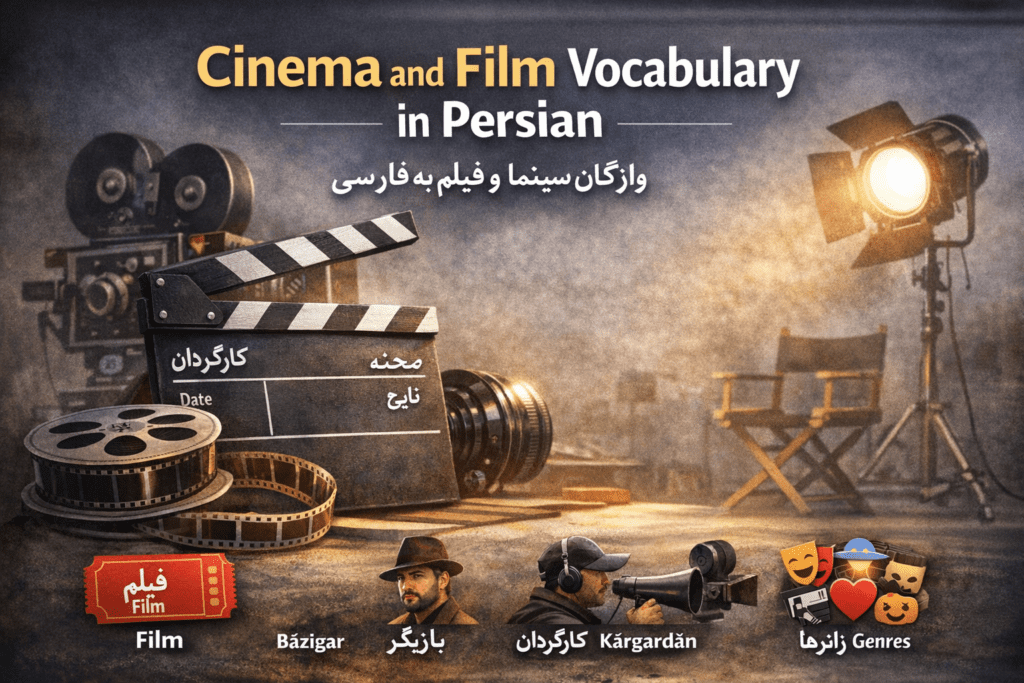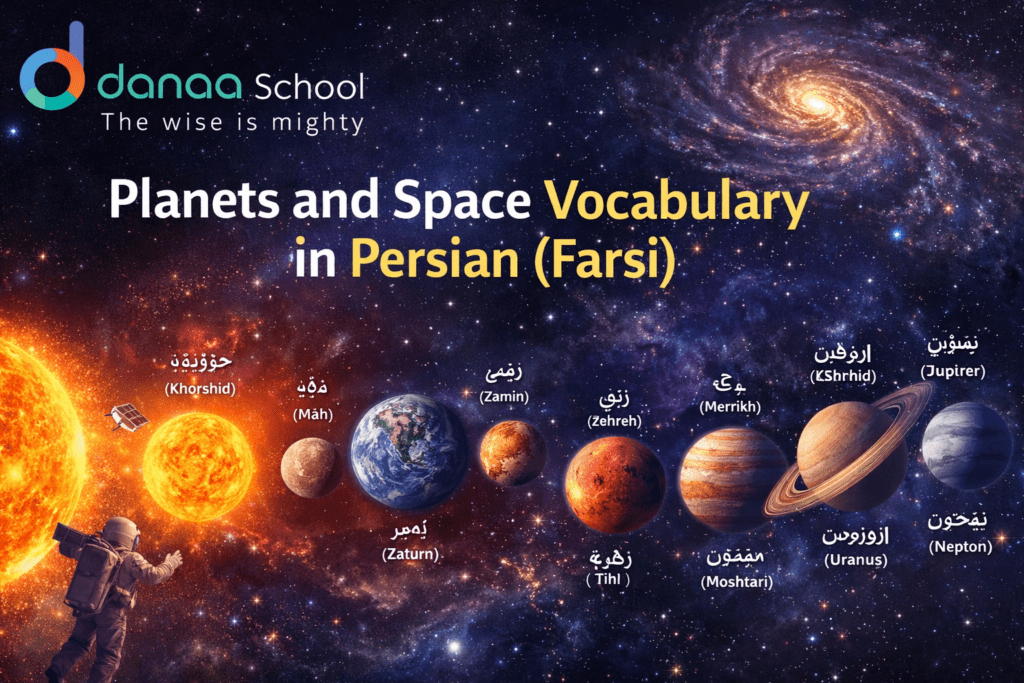If you’ve ever wondered, “Is Farsi easy to learn?” you’re not alone. Many aspiring language learners are drawn to Farsi, or Persian, due to its rich history, beautiful poetry, and its widespread use in Iran and other Persian-speaking regions. But, like any language, learning Farsi comes with its own set of challenges.
In this guide, we’ll break down the Farsi language difficulty, focusing on grammar rules, vocabulary, pronunciation, and the writing system. We’ll also share valuable tips and resources to help you along your learning journey, such as online courses, language apps, and immersive techniques. Plus, you’ll get an inside look at Danaa School’s Farsi course and how their experienced instructors can support you. Let’s dive in!
Is Farsi Easy to Learn? Let’s Break It Down
Farsi, like many languages, presents unique challenges and benefits for learners. Whether you’re just beginning or considering diving in, here are the core factors that can help you gauge the difficulty:
1. Farsi Grammar Rules: Easier Than You Think
Compared to languages like Arabic, Farsi grammar is relatively straightforward. There’s no gendered nouns like in French or German, and verb conjugations tend to follow simpler patterns.
For example:
-
- Verbs in Farsi conjugate for tense (past, present, future) but remain fairly regular in structure.
-
- Sentence structure is generally Subject-Object-Verb (SOV), which can take a little getting used to, but once you nail the basics, it flows naturally.
In short, Farsi grammar is simpler than it looks at first glance. So, in terms of grammar rules, Farsi is easy to learn for many beginners.
2. Persian Vocabulary: A Mix of Familiar and Unique
If you speak English, you’ll be happy to know that Farsi has borrowed several words from other languages, including French, English, and Arabic. But it also has its own unique vocabulary, which will take some memorization.
-
- Example of borrowed words:
-
- Television: “تلویزیون” (Televizioon)
-
- Bank: “بانک” (Baank)
-
- Example of borrowed words:
- Farsi also contains loanwords from Arabic, but fortunately, you don’t need to learn Arabic to master Persian vocabulary.
Best Ways to Build Your Farsi Vocabulary Effectively
3. Farsi Pronunciation Tips
Farsi pronunciation can be a little tricky for English speakers, particularly because it uses some sounds that don’t exist in English. However, it lacks tones (like in Mandarin) and generally doesn’t have too many tricky sounds to master.
Some quick tips:
-
- Pay close attention to vowels: Farsi has short and long vowel sounds, and getting these right will make a huge difference in how well you’re understood.
-
- Practice common Farsi phrases out loud daily to improve your accent and fluency.
4. Farsi Writing System: Not as Hard as It Seems
The Farsi language uses the Persian alphabet, which is based on Arabic script but has four additional letters. It’s written from right to left, which can feel odd at first, but many learners find it fascinating.
Though the writing system may seem like a big hurdle at first, with regular practice, you can quickly pick up reading and writing in Farsi. Plus, some language learning resources come with Romanized scripts to help you along the way.
Cultural Aspects of Farsi: A Gateway to Persian History
One of the most enjoyable parts of learning Farsi is that it opens a door to Persian culture, literature, and history. Many people are motivated to learn Farsi because they want to read classical poetry by Rumi, Hafez, or Ferdowsi in its original language, which adds a beautiful dimension to the learning process.
Challenges in Learning Farsi
Despite its simplicity in grammar and its relatively accessible pronunciation, Farsi does have its challenges, including:
-
- Verb Conjugations: While Farsi has regular patterns, learning how verbs change depending on tense and subject can still be tricky for beginners.
-
- Farsi Writing System: The script requires time and dedication to master, especially if you’re not familiar with Arabic letters.
-
- Limited Learning Resources: Although growing, Farsi isn’t as widely taught as Spanish or French, so finding good resources, especially intermediate to advanced ones, can sometimes be a challenge.
How to Learn Farsi: Best Methods and Resources
When it comes to learning Farsi, combining various methods will give you the best results. Here are some effective strategies:
1. Farsi Language Apps
Many language apps now include Farsi, helping you learn vocabulary and phrases on the go. Apps like Duolingo, Memrise, and Drops offer basic Farsi lessons. However, they often lack in-depth explanations, so you may need additional resources.
2. Online Farsi Courses
For more comprehensive learning, online courses are a great option. Websites like Danaa School offer structured courses designed by native speakers. These courses provide everything from beginner lessons to advanced grammar, vocabulary, and cultural nuances.
3. Immersive Learning Methods
If you’re serious about learning Farsi, immersion is key. You can:
-
- Watch Iranian movies with subtitles.
-
- Listen to Persian music or podcasts.
-
- Engage in language exchanges with native Farsi speakers through platforms like HelloTalk or Tandem.
The more you surround yourself with the language, the faster you’ll pick up vocabulary, pronunciation, and cultural context.
4. Books to Learn Farsi
A good textbook can make all the difference. Popular titles like “Complete Persian“ or “Persian for Beginners” offer structured lessons that you can follow at your own pace. They’re especially useful for understanding Farsi grammar rules in detail.
Why Choose Danaa School’s Farsi Course?
At Danaa School, you’ll learn from experienced native Farsi speakers who have years of teaching experience. Their method emphasizes not only language structure but also cultural immersion, helping you connect with the Farsi-speaking world on a deeper level.
Meet Danaa’s Professional Tutors
-
- Lida A. (United States)
Lida brings a wealth of experience in teaching Persian to non-native speakers. With a 5-star rating, her lessons emphasize conversational skills and cultural immersion. She’s taught over 14 students and offers a structured, enjoyable learning path for beginners.
- Lida A. (United States)
-
- Sara J. (Canada)
Sara is a dedicated instructor specializing in both Persian and Farsi. Her lessons are designed for learners at all levels, focusing on grammar, vocabulary, and sentence structure. Sara’s engaging teaching style has helped students build a solid foundation in Farsi.
- Sara J. (Canada)
-
- Saeedeh M. (Iran)
With a deep understanding of Persian literature and culture, Saeedeh offers an insightful learning experience. Her classes go beyond language, diving into the cultural aspects of Farsi, making her ideal for students who want to connect with Persian heritage.
- Saeedeh M. (Iran)
-
- Nafiseh R. (Turkey)
As a community tutor, Nafiseh focuses on creating a friendly, conversational environment. Her Farsi lessons help students build confidence in everyday speaking, making her classes perfect for beginners who want to improve their fluency.
- Nafiseh R. (Turkey)
Each tutor at Danaa School offers a unique approach, ensuring you find the right fit for your learning style.
FAQs
How long does it take to learn Farsi?
It depends on your dedication and the time you invest. For a basic conversational level, 6-12 months of consistent study could suffice, but becoming fluent might take a couple of years.
Is Farsi a hard language to learn?
It can be challenging, but Farsi is easier than many other languages, especially once you get the hang of its grammar and writing system.
Is Farsi easier than Arabic?
Yes! Many learners find Farsi’s grammar simpler and more intuitive than Arabic’s complex structures.
Is Turkish or Persian harder?
It depends on your background, but many argue that Persian is a bit easier than Turkish, especially because Turkish uses a more complex system of suffixes.
Is Persian worth learning?
Absolutely. Whether for travel, cultural appreciation, or career reasons, Persian opens doors to a rich history and connects you with millions of speakers worldwide.
Is Farsi a rare language?
Farsi isn’t as widely spoken as Spanish or French, but with over 80 million speakers globally, it’s far from rare.
Final Thoughts: Start Learning Farsi Today
Learning Farsi can be a rewarding experience, giving you access to Persian culture, history, and millions of native speakers. Whether you’re aiming to become fluent or just want to learn enough for travel, there are plenty of resources to help you. If you’re serious about learning Farsi, check out Danaa School’s Farsi course for expert guidance and structured lessons tailored to your needs.
So, is Farsi easy to learn? While it comes with its own challenges, with the right approach and dedication, it’s absolutely achievable!









